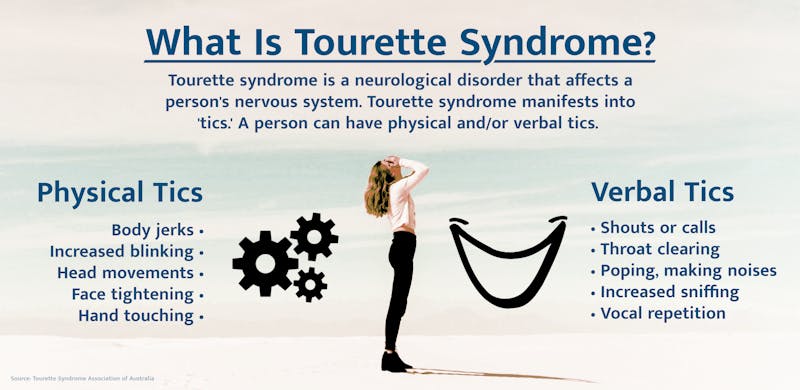Activities For People With Tourette Syndrome
 By
Casey Wise
By
Casey Wise

Everyone deserves the opportunity to learn, have fun, and be themselves. In a changing world, the chance to grow as a person, despite disabilities, is crucial. Today we are going to focus on Tourette syndrome and look at 12 activities a person can enjoy, despite having Tourette's. Whether that be listening to music, playing sports, or creating works of art, we want to show that even with Tourette's, a person can live a full and beautiful life. So, let's start with a quick summary of Tourette syndrome and what people with this condition go through on a daily basis.
What Is Tourette Syndrome
Tourette syndrome is a condition that was first named by French neurologist Jean-Martin Charcot. In 1885, Charcot published a paper revolving around 9 patients, where he concluded that they suffered from a neurological condition called 'convulsive tic disorder.' Although this may have been the first paper to document Tourette syndrome, the condition almost certainly predates the 1800s.
Charcot's description of 'tics' is something that has stuck around and is a good place to start when talking about what people experience with the syndrome. Tics can be separated into 2 main categories, physical and verbal. Physical tics can manifest as body jerks, increased blinking, or consistent tightening of particular muscles. Verbal tics can include shouts or calls, vocal repetition, or noise pops. Tourette's is different in every person, and symptoms can range from barely noticeable to extremely severe.
While the exact cause is unknown, medical professionals say that genetic and environmental factors can contribute to the severity. Tourette syndrome is also a condition that seems to affect children more than adults, with most people developing tics before the age of 18 and often losing a majority of those tics throughout their life.
Now that we've got you up to date on your Tourette syndrome knowledge, let's look at some fun games and activities that those suffering from the condition can enjoy or use to help with their symptoms. We will be focusing mainly on children with Tourette's - and this is when tics are usually most severe - but remember, fun isn't age-restricted; if you want to try some of these activities yourself, go for it!
1. Exercise
To start us off, exercise! Exercise is usually the best first step to take when suffering from many neurological conditions! Exercise has been shown to reduce anxiety, promote self-discipline, and result in better physical health. Exercise doesn't make the tics of Tourette syndrome stop, but they have been shown to reduce their rate and help the person with Tourette's generally feel better.
2. Makeovers & Dressup
A large part of Tourette syndrome is the feeling of being 'out of place' or not quite connected to your body. One way to celebrate that is to dress up and look your best. For those who like to do their makeup and put on their best clothes, the act of dressing up can make a person feel really good and give them confidence!
3. Painting
Painting has been a relaxation activity for as long as it has existed. Painting takes time and patience and can absorb the painter in a world of their own for hours at a time. For those with Tourette's, painting can relax the muscles and reduce the rate of tics. It also promotes the use of fine motor skills, and for children and adults alike, it's a ton of fun!
4. Communication
Communication may seem obvious, but in the digital era we live in, it can't be overstated. By sitting down, no phones or screens, and simply talking as friends or as a family, the therapeutic benefits of communication are second to none. Those with Tourette's can feel comfortable, express their thoughts and concerns, and the resulting environment can significantly reduce tics.
5. LEGO
Everyone knows the fun that can be had with Lego, and despite being simplistic, the limits on what to build are endless! People with Tourette's can engage their motor skills while building, and their focus and patience can increase considerably. There is even a field of therapy, called Legos therapy,' that solely focuses on this block game's ability to heal and understand people's problems.
6. Crochet and Knitting
Now, we don't know if you're aware, but knitting and crochet have become in vogue again, with some of the biggest stars on the planet enjoying the hobby. For those with Tourette's, this very meditative activity helps keep both body and mind focused and can help lessen tics.
7. Number and Word Games
Similar to the above, if the person in question has a passion for numbers (Sudoku) or word games (Crosswords), they can prove a fantastic way to keep the mind busy and the hands ready to mark down an answer. There are always sites to help if they're ever stuck, too.
8. Music
Assessments have revealed that active (playing) and passive (listening) participation in musical activity can significantly reduce tic frequency. It has been shown that tics significantly decrease, when a person with Tourette’s is engaged in music performance. Many believe that music's flow, patterns, and predictability, share distinct and potentially utilizable characteristics with obsessive habits.
9. A Quiet Space
There's nothing wrong with a little quiet. Disruptive or angry behaviors are reported in many people with TS, and for this reason, making a 'chill-out' zone to help a child calm down and center themselves can be a great tool. Knowing that they have a safe place to have tics and slowly relax can provide a sense of comfort.
10. Story Time
Writing is a great way to keep the mind busy and ignite the imagination. Kids and adults can quickly lose themselves in a little writing, and if you're not feeling like a storyteller, a letter to a friend is just as effective!
11. Rest
Around 80% of people with Tourette syndrome have sleep-related problems, which is far more than children in general. That's why it's important to rest when you feel you need rest. A little exercise and avoiding screen time before bed can help ease you into a more effortless and deeper sleep.
12. Use Humor
Laughter is a powerful thing. When you're feeling stressed or embarrassed, a little humor can not only hope you feel better momentarily but, over time, can help you come to terms with life's ups and downs in general. If you can find a reason to laugh daily, you're finding little moments of joy.
Conclusion
Tourette syndrome can vary significantly from person to person, but what's important to remember is the 'Three 'C's. Stay Calm, Be Confident, and Have Control. By combining the 'Three C's' with some of our suggested activities above to help with stress and tics, things should be a little easier for everyone involved.
About the Author

Casey Wise
Casey Wise is a British journalist, creative copywriter, and music creator with a deep passion for language, travel, and technology. Based in Barcelona, his work extends from local start-ups and newspapers to university radio and the British NHS.
Recent Clues
- "Call of Duty: Black ___" (video game) Crossword Clue
- Skinflint Crossword Clue
- Gather Crossword Clue
- UK/US television sitcom that starred Matt LeBlanc, Stephen Mangan and Tamsin Greig (8) Crossword Clue
- Ctrl-___-Del Crossword Clue
- Hebrew prophet Crossword Clue
- In speech, do away with troika? (6) Crossword Clue
- Coach's charge Crossword Clue
- Care for Crossword Clue
- Rex perhaps playing in demo Crossword Clue
- Former name for Tokyo Crossword Clue
- Medieval letter Crossword Clue
- *Removing lumps from, in a way Crossword Clue
- Indian musical instrument with movable frets (5) Crossword Clue
- Discrimination is borne by great revolutionary Crossword Clue
- Make a choice Crossword Clue
- Organisation recently left by Elon Musk (abbr.) Crossword Clue
- Money owed Crossword Clue
- Wipe out Crossword Clue
- Encircle (8) Crossword Clue
- Pencil eraser (6) Crossword Clue
- Squashed circle Crossword Clue
- Garner Crossword Clue
- Walk on or step Crossword Clue
- Bishop is primarily made to take appropriate sacrament Crossword Clue
- Nigeria's continent, for short Crossword Clue
- Routine job employing first Queen singer Crossword Clue
- -- standstill Crossword Clue
- *Confirm to be true Crossword Clue
- Flame-loving insects Crossword Clue
- Brings up Crossword Clue
- Fibber (4) Crossword Clue
- Slyness Crossword Clue
- Hall of Famer Shaquille Crossword Clue
- *Buying a gallon of milk, picking up the laundry, etc. Crossword Clue
- "Bosch" star Welliver Crossword Clue
- 1805 conflict Crossword Clue
- Living in a city or town (5) Crossword Clue
- Somewhat spherical female Crossword Clue
- Charge Crossword Clue
- Boring do: suite horrible Crossword Clue
- Eight-time Olympic gold medalist Bolt Crossword Clue
- Space - and freedom (5,4) Crossword Clue
- Hurry Crossword Clue
- Sees romantically Crossword Clue
- Groupie heard to follow turkey? It's a joke (3,6) Crossword Clue
- Goods vehicle Crossword Clue
- Candy as dessert food (9) Crossword Clue
- Scottish sweet - a medicinal dose (6) Crossword Clue
- "___ are you?" Crossword Clue
Trending Clues
- Notify with a delivered message (2 wds.) Crossword Clue
- Congressional record? Crossword Clue
- Palm starch Crossword Clue
- Exasperated question Crossword Clue
- Sch. Crossword Clue
- Old cry of regret Crossword Clue
- Henry Purcell semi-opera Crossword Clue
- Girls in Tech founder Gascoigne Crossword Clue
- Dated feminine suffix Crossword Clue
- Baker's powder Crossword Clue
- Big name in transparent Band-Aids for toddlers? Crossword Clue
- Temporary art media Crossword Clue
- Dragnet Crossword Clue
- Finger drum Crossword Clue
- Remy's brother in "Ratatouille" Crossword Clue
- Poker tactic Crossword Clue
- Travels on foot Crossword Clue
- Public walkway Crossword Clue
- Super Bowl that featured a 28-3 comeback win by the Patriots Crossword Clue
- Squat (Hyph.) Crossword Clue
- Hard, dry biscuit Crossword Clue
- Prefix that means 1-Across Crossword Clue
- Incompatible with Crossword Clue
- Dragnets Crossword Clue
- Muslim head covering Crossword Clue
- Explicit subject for her? Crossword Clue
- In eager desire Crossword Clue
- Rock with bands Crossword Clue
- Language in southern India Crossword Clue
- Mystery-writing award Crossword Clue
- Ancient theaters Crossword Clue
- Swiss snowfield Crossword Clue
- French composer Gabriel Crossword Clue
- Funny fellow Crossword Clue
- Chill (with) Crossword Clue
- Ardent Crossword Clue
- Magical letters Crossword Clue
- On the left, nautically Crossword Clue
- "Ratatouille" rat Crossword Clue
- Comedian Wyatt Crossword Clue
- Appropriate word that can precede 7-/8-Across and 3-/10-Down Crossword Clue
- Photoshop maker Crossword Clue
- Item on the base of Maslow's hierarchy Crossword Clue
- Lampoon Crossword Clue
- Artist's studio Crossword Clue
- Done for laughs Crossword Clue
- Henry Purcell opera Crossword Clue
- Seal or walrus Crossword Clue
- Decent, in golf Crossword Clue
- Horse halter Crossword Clue

